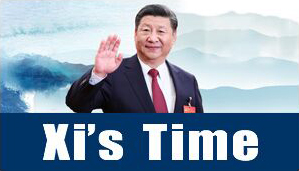BEIJING, Aug. 1 (Xinhua) -- Chinese President Xi Jinping spoke with U.S. President Joe Biden on the phone at the request of the latter on Thursday evening. The two presidents had a candid communication and exchange on China-U.S. relations and issues of mutual interest.
Experts and scholars, in interviews with Xinhua, said the talks between the two heads of state are candid and in-depth. They hold expectations that in a world of change and disorder, China and the United States can take the lead in upholding world peace and security and in promoting global development and prosperity.
They also urged the United States to honor the one-China principle and implement the three China-U.S. joint communiques both in word and in deed.
 Visitors practice Chinese calligraphy during an event at Smithsonian's National Zoo in Washington, D.C., the United States, April 16, 2022. (Xinhua)
Visitors practice Chinese calligraphy during an event at Smithsonian's National Zoo in Washington, D.C., the United States, April 16, 2022. (Xinhua)
DIRECT TALKS CONDUCIVE TO CHINA-U.S. TIES
In the view of former U.S. Ambassador to China Max Baucus, talks between the two heads of state are "very good," because the more they talk to each other, the more likely that the two countries can resolve their differences.
Singaporean political commentator Ang Teck Sin said candid and in-depth communication between the two countries' heads of state carries great significance.
There is vast room for coordination and broad scope for cooperation between China and the United States, he said.
Ronnie Lins, director of the China-Brazil Center for Research and Business, said the talks between the two heads of state sent a positive signal to the world, suggesting that as two important major countries, China and the United States would probably develop in concert for the sake of common interests of humanity.
He expressed the hope that the two countries would strengthen coordination and help promote world prosperity and development.
Lucio Blanco Pitlo, research fellow at Philippine think tank Asia-Pacific Pathways to Progress Foundation, said the phone conversation between Xi and Biden sent a positive signal, revealing that China and the United States attached importance to the impact of their relations on the world's development.
It is hoped that the two countries can manage their differences through communication and dialogue, and preserve world peace and stability, Pitlo said.
Charles Onunaiju, director of the Abuja-based Center for China Studies in Nigeria, noted that the phone call came at an important time when tensions across the world are rising and headwinds facing the global economy are growing, and the communication between the two sides at the highest level itself bears great value.
He noted that Washington is misperceived to see China as a strategic competitor and rival and that can easily send wrong signals both to people of the two countries and to a larger world.
There is no doubt that if China and the United States seek common ground while addressing their differences, they "can be in a better position to address issues not only of their concerns but that of the rest of world," Onunaiju said.
MUCH-NEEDED LEADING ROLE AMID GLOBAL CHALLENGES
French writer and sinologist Lea Bessis said she has seen from this conversation that President Xi is firm in looking for solutions to problems between China and the United States for the common good of the world.
At the global macroeconomic level, coordination and dialogue between China and the United States are crucial, she noted, adding that the United States should refrain from economic decoupling, and that the two sides should work to strengthen trade ties and achieve win-win cooperation.
Lins expressed his hope that China and the United States play a leading role in tackling global challenges such as poverty and social inequality, which are the common enemies of all countries.
Cavince Adhere, a Kenya-based international relations scholar, said it is good to see the leaders seek candid solutions to the challenges facing bilateral relations, adding that premised on mutual respect and productive outcomes, Washington and Beijing can bring much value not just to themselves but also to the rest of the world.
Gamal Zahran, professor of political studies in the faculty of Commerce at Egypt's Suez Canal University, called on Washington to demonstrate more sincerity in dealing with global economic and political problems.
The world needs China-U.S. cooperation to limit stagflation and waits for the two major countries to overcome the state of uncertainty as well as the economic and political chaos that is troubling the world, he added.
Bridging differences between China and the United States is a shortcut to properly resolving current international issues, said Kwon Ki-sik, head of the Korea-China City Friendship Association.
Only by sticking to the path of cooperation, can China and the United States promote cooperation in international security, help the world overcome the impacts of the pandemic at an early date, and get rid of the shadow of economic stagnation, so as to build a more stable and prosperous world, the South Korean expert noted.
ONE-CHINA PRINCIPLE
Adhere said the Taiwan question remains the most important and sensitive issue in China-U.S. relations simply because the United States has consistently used the Taiwan question to contain China.
There is no question that Taiwan is an inalienable part of China, a fact that is known to the United States, he added, noting that the U.S. side should respect China's core interests and major concerns.
It is extremely wrong for the United States to try to undermine China's reunification, create instability in the region and even launch a propaganda war against China, Bessis said, referring to recent U.S. provocations over China's Taiwan.
What the United States is doing is an extremely dangerous game. The U.S. should abide by the one-China principle, the French writer urged.
Noting that the United States repeatedly tested China's bottom line, Onunaiju said Washington should match its words with deeds and stop making troubles.
Referring to Xi's words that the will of the people cannot be defied and those who play with fire will perish by it, Kwon said it is China's warning to those external forces who attempt to undermine the one-China principle.
The United States should stop arms sales to Taiwan, call off military actions that create tension across the Taiwan Strait, and implement the three China-U.S. joint communiques, Kwon added.
Ang, the Singaporean political commentator, also noticed Beijing's warning to Washington on the Taiwan question.
This clear warning once again demonstrates to the United States and the world China's firm will to safeguard national sovereignty and territorial integrity, he said. "We hope the United States will match its words with deeds and refrain from frequently provoking China's red line." ■




